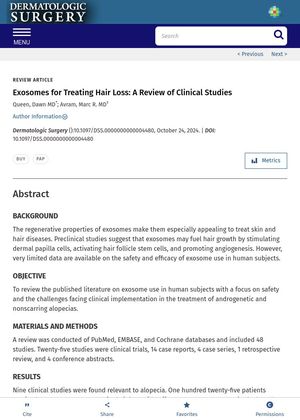TLDR Exosomes might help with hair loss, but more research is needed to confirm their safety and effectiveness.
Exosomes show potential for treating hair loss due to their regenerative properties, which may stimulate hair growth by affecting dermal papilla cells and hair follicle stem cells. A review of 48 studies, including 25 clinical trials, identified 9 relevant to alopecia, involving 125 patients who received exosome treatments. While side effects were rare, the broader dermatology field has reported at least 10 serious adverse events. The review concludes that larger, well-designed clinical trials with longer follow-up are needed to establish efficacy, alongside consistent manufacturing standards and regulatory oversight to ensure safety.
 August 2024 in “Aesthetic Plastic Surgery”
August 2024 in “Aesthetic Plastic Surgery” Exosome treatment safely increases hair density in male patients with androgenetic alopecia.
 2 citations
,
August 2024 in “International Journal of Dermatology”
2 citations
,
August 2024 in “International Journal of Dermatology” Adipose stem cell-derived exosomes are safe and effective for hair regrowth in AGA patients.
 July 2024 in “Journal of Cosmetic Dermatology”
July 2024 in “Journal of Cosmetic Dermatology” Rose stem cell exosomes can significantly improve hair growth in androgenetic alopecia.

Exosomes may be more effective than PRP for hair restoration.
 February 2024 in “Journal of Cosmetic Dermatology”
February 2024 in “Journal of Cosmetic Dermatology” White hair patch repigmented and hair regrew in a balding patient after treatment with exosomes and laser.

A woman regrew her hair after receiving injections of special cell-derived vesicles.
10 citations
,
February 2022 in “Journal of cosmetic dermatology” Exosomes from fat-derived stem cells may help regrow hair.
13 citations
,
December 2021 in “Journal of Cellular and Molecular Medicine” Exosome-enriched vesicles from placental cells improved skin condition in a patient with chronic graft-versus-host disease.
 47 citations
,
February 2021 in “Pharmacological research”
47 citations
,
February 2021 in “Pharmacological research” Exosomes can improve skin health and offer new treatments for skin repair and rejuvenation.
9 citations
,
August 2019 in “Journal of the American Academy of Dermatology” Exosomes from stem cells may help treat hair loss.
 87 citations
,
April 2018 in “Biochemical and Biophysical Research Communications”
87 citations
,
April 2018 in “Biochemical and Biophysical Research Communications” Exosomes from dermal papilla cells can help grow hair and might treat hair loss.
 148 citations
,
December 2018 in “Journal of autoimmunity”
148 citations
,
December 2018 in “Journal of autoimmunity” Alopecia areata is an autoimmune disease causing patchy hair loss, often with other autoimmune disorders, but its exact causes are unknown.
May 2018 in “Journal of cosmetology & trichology” Combining platelet-rich plasma therapy with prostaglandin-F eye drops can significantly regrow hair in alopecia universalis.









